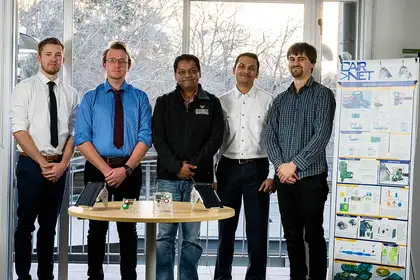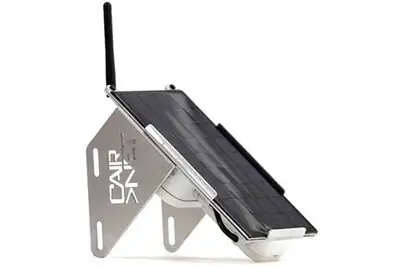
Massey students Darryn Wells, Tyrel Glass, Fakhrul Alam (supervisor), Madhav Kruthiventy, and Baden Parr.
A Massey University engineering team has been chosen to compete in New York City later this year after impressing judges with their air-quality monitoring network.
The Keysight Technologies Incorporated’s Internet of Things (IoT) Innovation Challenge asks teams from around the world to conceptualise a low-power sensor network to tackle urbanisation.
The four-man team submitted their project, CAIRNet (Climate Air Information Real-time Network), a real-time low-cost IoT-based air-quality monitoring network.
The project was deemed to be the top of 300 projects in the Asia-Pacific/Greater China region’s Smart Land Challenge category, beating out teams from Singapore, South Korea, Australia and two from the University of Auckland.
The team is supervised by Massey University’s Dr Fakhrul Alam and comprised of PhD student Baden Parr, along with Bachelor of Engineering with Honours graduates Tyrel Glass, Madhav Kruthiventy and Darryn Wells.
In September, two of the students will travel to New York to participate in the global round and put their case forward to a world-class panel of judges. If they win their category, they will be awarded US $20,000 and US $20,000 worth of select Keysight test equipment. If they can win against all five other teams, they can take home US $50,000 cash prize and US $50,000 worth of Keysight test equipment for the university.

The CAIRNet sensor.
What is CAIRNet?
At the heart of CAIRNet is a low-cost sensor node that utilises cost-effective sensors to measure carbon monoxide and nitrogen dioxide, particulate matters, temperature and humidity. Each sensor is capable of long-range and low power communication over a network of IoT and short-range, high data rate, communication over Wi-Fi. It is solar powered, weather resistant and designed to be easily deployed at a large number of locations. The data collected from the sensor nodes is stored in a cloud-based server and is ultimately displayed on a web page for end-users.
Dr Alam says this is an incredible accomplishment by the team, who also won Massey’s Albany campus capstone project last year. “I always believed that Massey produces world-class engineers and this reinforces my belief.”
“At present, air quality monitoring stations are confined to only a small number of locations due to the high cost of the monitoring equipment. They provide a low fidelity picture of the air quality in the city; local variations and pockets with high densities of pollutants are overlooked. Monitoring of air pollution is of significant importance to raise public awareness and involvement in human health and sustainable urban environments.”
The work has impressed air quality scientists from the National Institute of Water and Atmospheric Research (NIWA) and other governmental agencies and has received funding from the Massey University Research Fund and the Ministry of Business, Innovation and Employment Product Accelerator Fund.
“Currently we are working with the NIWA scientists to co-locate a few of our sensor nodes with their’s and council’s air quality monitoring stations,” Dr Alam says. “This will help us calibrate the sensors. Once calibrated, we will employ a large number of the nodes across Auckland, and eventually other New Zealand cities, to collect data to show air quality in the city in real-time. We also plan to use big data analytics and machine learning to run an AI engine to forecast air pollutant information.”
Director, IoT Innovation Challenge Program at Keysight Cheryl Ajluni said, “The quality of entries we received for Keysight's IoT Innovation Challenge have been truly amazing. Our panel of 15 judges faced an extremely difficult task paring down the almost 300 entries to just the top six.”
For more information on the challenge, check out the event website.